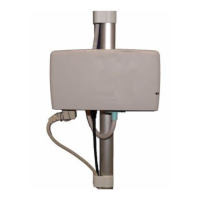Using Pulse Alarms 8Monitoring Pulse Rate
139
WARNING Selecting Pulse as the active alarm source for HR/Pulse switches off the arrhythmia alarms listed in the
section “ECG and Arrhythmia Alarm Overview” on page 106, including Asystole, Vfib and Vtach
alarms, and the heart rate alarms. This is indicated by the message ECG/ARRH ALARM OFF (unless
this has been configured off for your monitor), and the crossed-out alarm symbol beside the ECG heart
rate numeric. The message ECG/ARRH ALARM OFF can be configured off, or to switch to a yellow
(medium severity) INOP after a fixed number of hours.
High and low pulse rate and extreme bradycardia and extreme tachycardia alarms from pulse are active.
Alarm Source Selection Disabled
If Alarm Source Selection is disabled, you cannot change the alarm source. If you try to change the
source, the monitor displays the message To activate enter Config and enable
Alarm Source Selection. This setting can only be changed in Configuration Mode.
Changing HR/Pulse Alarm Limits
As Pulse and HR share the same high and low alarm limits, if you change the alarm limit in the
Setup Pulse menu, the high or low alarm limits for HR in the Setup ECG menu change
automatically, and vice versa. The only exceptions are caused by a low limit clamp for each
measurement: the lowest value for Pulse when derived from SpO
2
is 30 bpm; for HR 15 bpm, and for
Pressure 25 bpm.
Extreme Alarm Limits
The extreme rate alarms, Extreme Tachy and Extreme Brady, generated by the active alarm source,
either HR or Pulse, are set in Configuration Mode by adding a set value to the high and low alarm
limits. You need to know what value has been configured for your monitor. Changing the high and
low alarm limits automatically changes the extreme alarm limits within the allowed range.
♦ To s e e t he v al ue s a dd ed t o t h e h i gh an d l ow l i m i t al arms to create the extreme rate alarms for your
monitor, in the Setup ECG menu, see the menu items Extr.Tachy and Extr.Brady.
QRS Tone
The active alarm source is also used as a source for the QRS tone. You can change the tone volume in
the
Setup SpO
2
and Setup ECG menus and the QRS tone modulation in the Setup SpO
2
menu.
WARNING The audible QRS tone might be influenced by external interference and is not intended to be used as a
substitute for ECG based arrhythmia analysis.
If arrhythmia detection is needed, do not rely on the audible QRS tone.
There will be no QRS tone when the X2 is connected to a host monitor.

